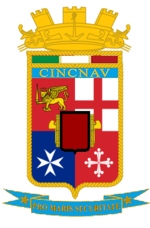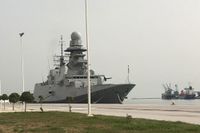Italian National Royal Navy (Kingdom of Italy)
| Italian National Royal Navy | |
|---|---|
| Regia Marina Nazionale Italiana | |
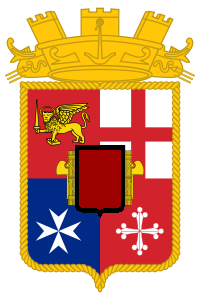 The Coat of Arms of the Italian National Royal Navy | |
| Active | 1861-Present |
| Country | Italy |
| Branch | Navy |
| Size |
41,612 personnel 330 vessels (incl. minor auxiliaries) 150 aircraft |
| Part of | Italian Armed Forces |
| Headquarters | Città Militare Cecchignola, Rome, Italy |
| Anniversaries |
1 March 1948 (Establishment of the National Republican Navy) 1 March 2013 (Establishment of the Italian National Royal Navy) |
| Engagements |
III War of Independence World War I African War |
| Insignia | |
| Jack |
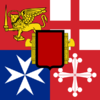 |
| Aviation roundel | 50px |
| Naval Ensign |
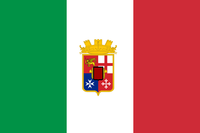 |
The Italian National Royal Navy (Italian: Regia Marina Nazionale Italiana; abbreviated as R.M.N.I.) is the maritime defence force of the Kingdom of Italy. It is one of the four branches of Italian Armed Forces and was formed in 1948 from the Savoy-related Regia Marina. As of August 2014, the Navy had a strength of 41,612 personnel with 330 vessels (incl. minor auxiliaries) in service.
Contents
The Italian National Royal Navy is divided into seven corps (by precedence): five officers corps, one corps dedicated to the other ranks, and the Coast Guard Corps, which groups both officers and other ranks.
- Corpo di stato maggiore – Corps of Staff Officers (SM) (line officers);
- Corpo del genio navale – Corps of Naval Engineering (GN);
- Corpo delle armi navali – Corps of the Naval Arms (AN);
- Corpo sanitario militare marittimo – Maritime Military Medical Corps (MD for medics; FM for Pharmacists);
- Corpo di commissariato militare marittimo – Corps of Military Maritime Commissariat (CM) (administration);
- Corpo della Guardia costiera – Coast Guard Corps (CP);
- Corpo degli equipaggi militari marittimi – Corps of the Military Maritime Crews (CEMM).
Overall organization
The Italian National Royal Navy depends on the Duce, who is commander in chief of the Armed Forces, and, operationally, by the Ministry of National Defence, through the Defence General Staff. The Navy then has an its own Staff with its own Chief of Staff, from which depend all other organs:
- Naval Squadron,
- Arditi Commandos,
- Logistic Command,
- Schools Command
- Navy Hydrographic Institute
- Higher Command for Italian East Africa.
In addition, the Coast Guard Corps depends on the Navy for certain matters.
General Staff
The General Staff of the Italian National Royal Navy is the high command of the Navy in charge of planning the objectives and strategic programs of armed force. The operating arm is CINCNAV, Commander in Chief of the Naval Fleets. The main tasks of the General Staff are to carry out study, research, development and general direction, while leaving strategic decisions to the General Staff of Defence and its units.
Organization
At the head of the General Staff is the Under-Chief of Staff. The General Staff uses
- 7 Units: personnel, planning, infrastructure, submarines, aircraft, military transports, projects and studies, logistics;
- 9 Offices: legal affairs and litigation, planning and financial planning, general affairs and external relations; personnel, schools, Watch Coordination, Communication, administrative responsibility, G.N.R. Navy;
- 2 Inspectorates: logistics and health.
The Hydrographic Institute of the Navy (Italian: Istituto Idrografico della Marina) is one of the mapping organs of the state (together with the Land Registry, the Centre Aeronautical Geo-Topographical Information, the Military Geographic Institute, the Geological Survey). It has among its aims the improvement of the safety of maritime navigation, the development of knowledge of the seas, the facilitation the conduct of the Navy units. The Institute's campaign activity is carried out today with the Magnaghi, Arethusa, and Galatea ships, which also serve as a spy-ships.
Command of the Italian Fleet (ships, submarines and amphibious forces) and Naval aviation falls under Commander in Chief Naval Suadron (Italian: Comandante in Capo della Squadra Navale, CINCNAV), a Naval Squadron Admiral. The main duty of CINCNAV is the preparation and continuous use of air and naval and amphibious forces under its authority to oversee the maritime spaces of national interest. The Italian National Royal Navy units assigned to the Mediterranean Sea are framed in the Naval Fleet, directly employed by CINCNAV. The units not framed in the Naval Squadron are allocated to the various functional departments. The Mediterranean Naval Squadron is divided into seven commands:
- Offshore Forces Command (COMFORAL);
- Coastal Patrol Forces Command (COMFORPAT);
- Landing Forces Command (COMFORANF);
- Naval Aviation Command (COMAVINAV);
- Underwater Forces Command (MARICOSOM):
- Mine Countermeasures Force Command (COMFORDRAG);
- Auxiliary Forces Command (COMFORAUS).
Offshore Forces Command
The Offshore Forces Command (Comando Forze d'Altura, COMFORAL) is divided into Naval Groups. The Naval Groups are the line formations of the Navy, and in turn they control auxiliary local ships (MARISTAV). At any time, at least one Naval Group is ready to deploy in 72 hours outside the Mediterranean Sea. The Command mostly employs dedicated surface warships, such as aircraft and helicopter carriers, landing helicopter docks, destroyers, frigates and multipurpose offshore/heavy patrol vessels. The aircraft carrier "Roma" is the flagship of the whole fleet. In the Mediterranean Sea there are five Naval Divisions:
- COMDIVNAV 1: HQ Ancona;
- COMDIVNAV 2: HQ Taranto: traditionally the most important Naval Division;
- COMDIVNAV 3: HQ La Spezia;
- COMDIVNAV 5: HQ La Valletta;
- COMDIVNAV 6: HQ Palermo.
Logistic Command
The Logistic Command (Italian: Comando Logistico) is responsible for the requirements of logistics management of the Italian National Royal Navy. The Logistic Command of the Navy is subdivided into:
- Logistics Command East: HQ Ancona (jurisdiction for Albania, Montenegro, Rhodes and Dodecanese, as well as for Italian East Coast);
- Logistics Command Libya: HQ La Valletta (jurisdiction for Libya, Channel of Sicily, Malta, Lampedusa, Pantelleria and Pianosa);
- Logistics Command West: HQ Livorno (jurisdiction for Tyrrhenian and Ligurian Seas, as well as for Italian West Coast, Sicilian Northern Coast, Sardinia and Corsica);
- Logistics Command Italian East Africa: HQ Mogadishu (jurisdiction for Read Sea and Indian Ocean, as well as for Abyssinia, Eritrea and Somalia).
The area logistics commands depend on the Logistic Command for logistic tasks and functions; depend on the Chief of Staff of the Navy for territorial tasks and functions; Logistical Command Italian East Africa depends on the Higher Command.
Higher Commands
The Higher Commands (Italian: Comandi Superiori) are R.M.N.I. commands which deal with defence issues related to the realms of the Italian Empire other than Italy. These Higher Commands are held by an Naval Squadron Admiral, and retain an high degree of autonomy from the Navy Staff: in peacetime they are under almost full operational control of their Higher Commander (Comandante Superiore), which in turn depends on the Chief of Navy Staff, with. However, in wartime, they depend only on the Defence General Staff, on the Joint Operations Command and on CINCNAV. It is to note that local Governments have no authority over the relevant Higher Command or Command (although they do have authority on their own Coast Guards). As of 2013, only the Higher Command Italian East Africa exists, while sea defence of the Mediterranean Sea is carried out by three Commands directly part of the central organization. Mediterranean Commands have mainly logistical and administrative functions.
Higher Command Italian East Africa
The Higher Command "Italian East Africa" (Italian: Comando Superiore Africa Orientale Italiana, COMSUPAOI, HQ Mogadishu) is a detachment of the Navy with jurisdiction for Read Sea and Indian Ocean, as well as for Abyssinia, Eritrea and Somalia. Navy Higher Command AOI exercises command and control authority over R.M.N.I. forces deployed within its jurisdiction. It is to note that the Army Higher Command AOI has the same territorial boundaries of the Navy Higher Command AOI (although of course a very different scope), in order to ease the cooperation and the coordination between them.
COMSUPAOI has four basic strategic missions. Firstly, it must ensure coverage of the outside steps of the steps they place in the Red Sea and then in the Mediterranean Sea (Gulf of Aden and Mandeb Straits), so as to protect the focal areas and terminals of the Italian lines of communication. Therefore, it is responsible for maintaining the Mediterranean Sea and the Red Sea in a safe state. Finally, it is the designated command to make any overseas operations in the area and also provides support to any allied marine operations in the oceans.
While Mediterranean-based Commands are merely territorial subdivisions of the Naval Fleet, Higher Command Italian East Africa retains a significant operational autonomy. It is internally organized in order to sustain and conduct operations and management with a significant autonomy degree. It has therefore an its own organization, exercising also territorial functions, centred on five Detachments:
- Offshore Forces Detachment (COMDIVNAV 4);
- Naval Aviation Detachment (DIAVINAV);
- Submarine Forces Detachment (MARIDISOM);
- Mine Countermeasures Force Detachment (DIFORDRAG);
- Logistics Command Italian East Africa.
The Offshore Forces Detachment (Distaccamento Forze d'Altura, i.e. Naval Group 4, COMDIVNAV 4) is the naval group tasked to operate in the Italian Eastern Africa. In order to fulfull its missions, it has an above-than-average strenght with 14 major ships:
- 1 Landing helicopter dock: Nave Trento (Trieste-class);
- 3 Destroyers: Nave Caio Duilio (Orizzonte-class), Nave Caio Catulo (Orizzonte-class), Nave Volusio Proculo (Ammiragli-class);
- 7 Frigates: Nave Libeccio (Comandanti-class), Nave Aliseo (Comandanti-class), Nave Luigi Rizzo (Comandanti-class), Nave Carlo Bergamini (Comandanti-class), Nave Orsa, Nave Perseo (Costellazioni-class), Nave Lupo (Lupo-class);
- 2 Offshore patrol vessels: Nave Legionario (Soldati-class), Nave Agente (Soldati-class);
- 2 Supply ships: Nave Euganea (Vulcano-class), Nave Berica (Montagne-class).
Aircraft carrier vessels
Impero-class aircraft carrier
- Nave Impero.
Trieste-class landing helicopter dock
- Nave Trieste;
- Nave Trento;
- Nave Vittorio Veneto.
Amphibious transport docks
San Marco-class landing platform dock
- Nave San Marco;
- Nave San Giusto;
- Nave San Giorgio.
Destroyers
Orizzonte-class
- Nave Caio Duilio
- Nave Caio Catulo
- Nave Andrea Doria
- Nave Benedetto Zaccaria
- Nave Raniero Dandolo
- Nave Alvise Mocenigo
- Nave Agostino Barbarigo
- Nave Agostino Canevari
Ammiragli-class
- Nave Volusio Proculo
- Nave Gaio Livio Salinatore
- Nave Marco Atilio Regolo
- Nave Marco Vipsanio Agrippa
- Lucio Emilio Regillo
